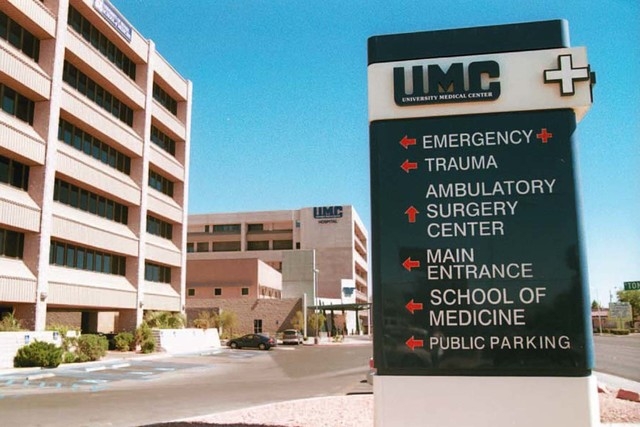UMC seeks power to close some meetings
University Medical Center officials want the public hospital’s board to have the power to conduct closed-door meetings about potential business plans and strategies that competitors might want to know about.
The hospital is asking Clark County commissioners to seek a change to state law that would allow the hospital’s board to go into closed-door meetings for “trade secrets.”
As a government agency, the commission can prepare as many as four bills for each session of the Nevada Legislature, which meets again in 2015. Commissioners on Tuesday will discuss requests for bills that county departments have submitted, including this one.
The issue’s conflict lies between the principles of open government and the hospital’s desire to avoid private-sector competitors learning about potential plans and disrupting them.
The request comes after the county has changed the hospital’s governance model. Commissioners decided last year to create a nine-member board and appoint members to govern the hospital’s affairs, with a broad delegation of powers, including approving contracts and setting policies. That board started meeting this year.
Subsidized by the county, the public hospital provides a variety of services that include care for the indigent, trauma services, a burn unit and general medical services.
Lawrence Barnard, UMC’s chief executive officer, said the goal of the proposal is to balance transparency with the public hospital’s need to be competitive. Without a change, he said, it will be difficult to have candid conversations about the hospital’s long-term strategy or brainstorm different ideas if competitors have the ability to attend meetings or review minutes.
For example, if the hospital board were to discuss the possibility of using a building to offer specialized services, a competing hospital could take competitive steps to disrupt those potential plans — such as leasing the building, he said. The competition has increased for all hospitals, including UMC, with an added need to generate revenue, he said.
That potential change could help the hospital be competitive and generate revenue while continuing its role of offering care to the indigent, Barnard said.
The idea doesn’t sit well with open-government advocates, who say the change would create a loophole for the public hospital.
“The problem with it is an example written into the law would have to be very narrow, and I’m not sure how that would be defined,” said Barry Smith, executive director of the Nevada Press Association.
“The second thing is, anytime you give an exemption and allow people to consider public business, which essentially is behind closed doors, there’s no accountability for what was said, what was discussed and what was done. Unfortunately, we see a lot of avoidance of the open meeting law or people trying to get around the open meeting law the way it is.”
He added: “They’re getting public money. They have that advantage and they have that added responsibility to do their work out in the open where the public can hear and judge for themselves what they’re doing with taxpayer money.”
Tod Story, executive director of the American Civil Liberties Union of Nevada, said, “To make an exception such as this, I think that taxpayers would take issue with the only publicly funded hospital in Southern Nevada cordoning off its meetings to the very citizens that fund the hospital.”
Nationally, open meeting laws can be problematic for public hospitals, said Barbara Eyman, general counsel for America’s Essential Hospitals, a trade group that represents public hospitals.
“It’s a big problem for some public hospitals where certain topics are open for all their competitors to see,” she said.
Public hospitals are increasingly expected to be more self-sustaining financially, Eyman said. Many public hospitals have reorganized their governance structures, in part because of state open meeting laws, she said.
“It’s a balance of trying to find the right mix of accountability,” she said.
Commission Chairman Steve Sisolak said he doesn’t know yet if the proposal is one that will have enough support to send to Carson City for the 2015 session.
If commissioners decide to pursue the idea with state lawmakers, work would start on more specifics.
“It’s still a public hospital,” he said. “It’s going to be quite a balancing act.”
The County Commission, also subject to the open meeting law, still has a role in overseeing UMC’s affairs, including appointing members to the board and approving the hospital’s final budget.
In the 2013 legislative session, the county unsuccessfully tried to get a bill passed for UMC that would have allowed the hospital to have a board.
That bill, which died in the Legislature, also would have allowed the hospital board to go into closed session to talk about competitive information.
Contact Ben Botkin at bbotkin@reviewjournal.com or 702-387-2904. Find him on Twitter: @BenBotkin1.

















